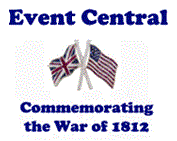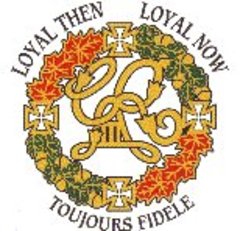When I was in grade school, the teachers didn't teach much about Canadian History and historical figures. We learned about the history of America, Plymouth Colony, William Penn, Ben Franklin, Paul Revere and George Washington and the Declaration of Independence. We didn't spend much time learning about Canadian historical figures such as John Butler, Sir Isaac Brock, John Graves Simcoe and the Simcoe Proclamation. If someone asked me ten years ago when the Acadian Expulsion was, I wouldn't have had a clue.
I learned most of my Canadian history from my father, who thought it was important to know where we came from, as a nation, and individuals. He took us to the actual battlegrounds of some of the most famous Canadian battles in our area, the battle of the Longwoods, Lundy's Lane, Cook's Mills etc. We also visited Fort George, Fort Erie and Fort Malden and learned about how the soldiers lived. We saw first-hand how the Loyalists lived everyday at Upper Canada Village and Black Creek Pioneer Village. We toured such places as the Mohawk Chapel, Alexander Graham Bell's home, and Heritage Village. I think I learned most of my Canadian history from my father. But, he couldn't teach me about his family history, and what information he did share wasn't always accurate.
But, if I had known about my family history, I would have known that my Doane, Twining, Deane and other ancestors were at Plymouth Colony, involved in the founding of large cities, such as Eastham (Nauset), I would have been more interested in American history. My Doane, Twining and Deane ancestors were acquainted with William Penn and were the first Quaker families who went to Pennsylvania from the colonies, too. I would have known that my Haines ancestors fought in Col. John Butler's Corps of Rangers and went through all of the hardships of being a Loyalist family in America and Upper Canada. I would have known that the Doan Gang almost changed the results of the Revolutionary war or that one of my Doan family was hung in London, Ontario for being a traitor in the Rebellion. History class would have been much more interesting if I had known about my family history.
By getting our youth more interested in their family history, and the part their families played in history, the personalities in history come to life and become more interesting. They can better envision what life would have been like in an earlier time.As the younger generation research their family history, they will acquire beneficial research skills which they can use in their other studies as well. Not only would their interest in history be peaked, but they would be more interested in geography and become familiar with the countries that their ancestors immigrated from and the social and economic conditions that they lived in. They would be more interested in the customs and traditions of their ancestors.
When children learn about their family history it may even make them more empathetic towards others and more accepting of different ethnic cultures. I think that there should be a family history course in elementary schools everywhere, for students to learn about their family and maybe they'll grow up with a more positive self-image and become more responsible, caring adults.
Here are some ideas: Family Tree Kids
Blog Archives
- Bradt History (5)
- Doan Family (9)
- Haines History (74)
- Loyalist History (28)
- Miscellaneous (24)
- UELAC (2)

